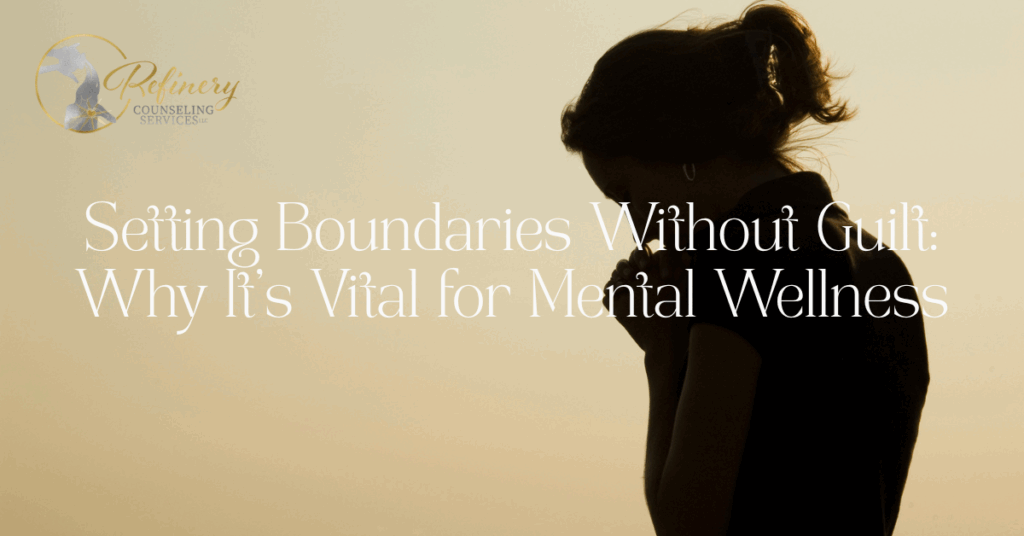For many of us, saying “no” doesn’t come naturally. Whether it’s a request from a friend, a work deadline that pushes into personal time, or an invitation to an event we feel obligated to attend, the pressure to be available, agreeable, and accommodating can feel overwhelming. But here’s the truth: boundaries are not barriers; they are bridges to emotional balance, healthier relationships, and a more peaceful life.
At Refinery Counseling Services, we often remind clients that boundary-setting is an act of emotional stewardship. It protects your mental health, your spiritual energy, and your God-given dignity. This article explores why setting boundaries is essential to mental wellness, how to overcome guilt, and what it looks like to practice this in everyday life.
What Are Boundaries Really?
Boundaries are guidelines you set for how you allow others to treat you, how you manage your time and energy, and how you protect your emotional and spiritual well-being. They define where you end and others begin.
Healthy boundaries:
- Clarify your needs and values
- Promote mutual respect in relationships
- Prevent emotional burnout and resentment
- Help you honor your limits without apology
They are essential in every area of life: relationships, work, parenting, ministry, and personal care.
Why We Feel Guilty for Setting Them
Many of us were raised to believe that being “nice” means being endlessly available. Cultural messages, religious misunderstandings, and family dynamics can all reinforce the idea that putting yourself first is selfish. But Scripture reminds us to love our neighbors as ourselves (Mark 12:31). That means self-care isn’t just permissible—it’s necessary.
When guilt arises, ask:
- Am I setting this boundary to harm someone, or to protect my peace?
- Is this guilt rooted in fear of disappointing others more than honoring God?
- What would I tell a loved one if they were in my position?
Boundaries are not rejection; they are redirection toward healthier interactions.
The Link Between Boundaries and Mental Health
Chronic stress, anxiety, and emotional fatigue are often tied to the absence of boundaries. When you say yes out of fear rather than desire, you begin to lose your sense of self.
Setting boundaries supports mental wellness by:
- Preventing overcommitment and burnout
- Reducing emotional overwhelm and resentment
- Creating space for rest and renewal
- Clarifying what truly matters to you
If you’re noticing symptoms of stress, fatigue, or emotional depletion, How to Recognize Mental Health Symptoms Early — And What to Do Next can guide you in taking the next steps toward support.
Boundaries Through a Faith-Integrated Lens
In the Gospels, Jesus often stepped away from the crowds to rest, pray, and be alone. He knew when to engage and when to retreat. That rhythm of connection and restoration models a life that honors limits without shame.
Faith-informed boundary-setting includes:
- Prayerfully discerning your capacity and calling
- Trusting that saying no can open space for God to move in other ways
- Releasing the need to fix, please, or over-function
Boundaries help you serve others from a place of fullness, not depletion.
Practical Ways to Begin
If you’re new to boundaries, start small. Here are a few ways to practice:
- “I appreciate the invitation, but I need a quiet evening to rest.”
- “I can’t take on anything additional right now.”
- “Let me think about that and get back to you.”
- “I want to be present when we talk, so now isn’t a good time. Can we connect later?”
Consistency builds clarity. And clarity is kind.
When Others Don’t Understand
Not everyone will celebrate your new boundaries. Some may resist, especially if they benefit from your lack of limits. That doesn’t mean you’re doing it wrong.
You are not responsible for others’ emotions. You are responsible for your own integrity, peace, and well-being. Therapy Is Not Just for Crises: 5 Myths About Mental Health Support explores how counseling can help you process relationship shifts and hold boundaries with confidence and care.
Final Encouragement
Setting boundaries doesn’t make you difficult. It makes you discerning. It means you are paying attention to what your soul needs and honoring the God who created you with limits on purpose.
You are allowed to say no without explaining. You are allowed to protect your peace. You are allowed to rest.
Boundaries are not something you earn the right to have. They are your right as a human being worthy of love, respect, and wholeness.
At Refinery Counseling Services, we support clients as they learn to set boundaries with clarity, grace, and courage. You don’t have to do this alone.

